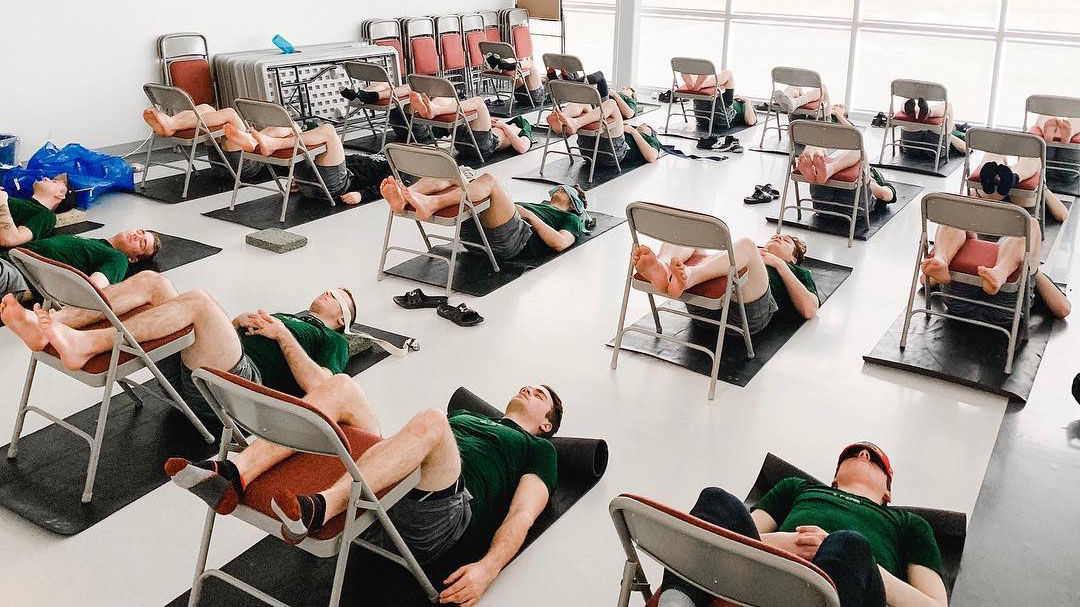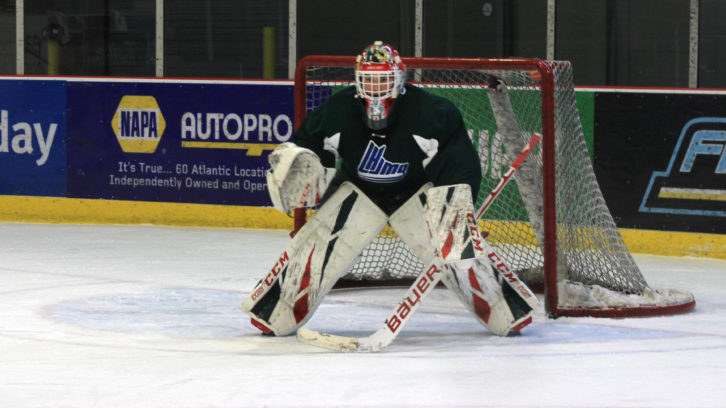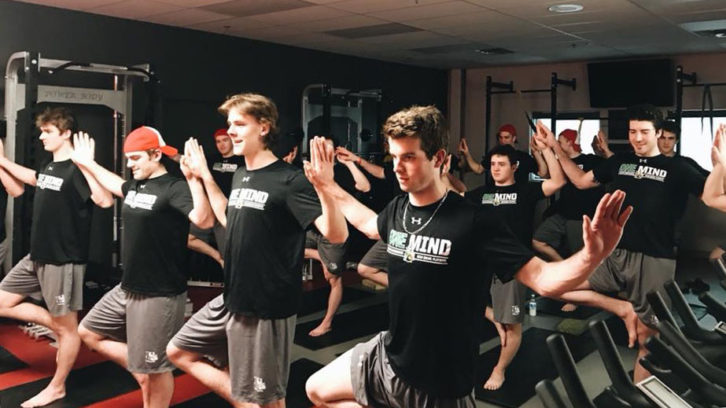Halifax Mooseheads show there’s room for both hockey and yoga
Aggression is common in men’s hockey and introducing yoga has become part of a larger conversation

caption
The Halifax Mooseheads do yoga to help with mental and physical relaxation before the playoffs in spring 2019.A yoga instructor and major junior ice hockey team are quietly challenging ideas around masculinity one tree pose at a time.
Jolene d’Entremont, owner of Yoga On, has been practicing yoga with the Halifax Mooseheads for over four years. She works with the team and individual players to prevent injury, relieve performance anxiety, and improve strength and flexibility.
“I’ve developed a way of working with them that is definitely complementary to what they are already doing,” said d’Entremont.
When working with hockey players, her focus is on the parasympathetic nervous system, which aims to conserve energy. D’Entremont emphasizes relaxation, often leading the team through guided meditations.
“It might be the one time where they’re not sort of being yelled at or expected to perform,” she said.
Shifting ideas around masculinity
In men’s hockey, excessive aggression and physical play is often celebrated. Fighting has become one of the main attractions in the sport — something that is constantly under scrutiny.
In a recent interview with the Toronto Sun, Conservative leadership candidate Peter MacKay said, “Trudeau does yoga, I play hockey.” Days later, MacKay was quoted in the National Post saying he would “rather fight him (Trudeau) UFC rules. Or on the ice — no headgear, no gloves.”
Some have taken to social media to say just because a man practises yoga doesn’t make him any less capable of leading.
OMG#yogagate !
The @PeterMacKay crowd wants to know what Cdns think of a MAN doing YOGA & getting SPA treatments like YOGA sessions or MASSAGE!Because the subtext is: what kind of a MAN does that when he could be playing HOCKEY (like a real man does)?@CPC_HQ#cdnpoli https://t.co/eg0syHTI7o
— Barbara Levesque (@belle_levesque) February 1, 2020
Stereotypes that men should be tough and participate in activities that display their strength continue to persist. This fixed mindset is especially prevalent in sports, said Tim Skuce, an assistant professor at Brandon University in Manitoba.
Skuce, who works in the faculty of education, said it’s problematic to suggest a man is weak because he participates in an activity that’s considered to be more feminine.
“When I listen to commentary, a lot of it is still entrenched in the particular way people think men have to play the game,” said Skuce.
“You know, playing tough, playing heavy, playing hard.”

caption
Halifax Mooseheads goalie Alexis Gravel prepares to block a shot. “I think people should start to realize that yoga is actually good for you and it’s good for your mental health as well.”Skuce is researching elite-level male hockey players’ experiences of masculinity. He believes the example of players not only practicing yoga, but also celebrating it, is a positive step toward reframing and reimagining masculinity.
“It’s really important to take a look at the discourse that we’re using,” said Skuce.
“I think these narrow constructs are starting to fracture, but as MacKay’s comments show, it’s still in existence. I don’t think they’re malicious, but it has implications if that’s the language you are using.”
Mooseheads players enjoy yoga
Alexis Gravel, a goaltender in his fourth season for the Mooseheads, turns to yoga to help prevent injury. The 19-year-old has been practicing yoga with d’Entremont since he began, which he said has been crucial to his success on the ice.
Because of the additional flexibility he requires as a goalie, Gravel sees d’Entremont one-on-one a couple of times a month on top of team sessions. He said yoga is crucial to keeping his hip flexors in good condition.
“I think people should start to realize that yoga is actually good for you and it’s good for your mental health as well,” said Gravel.
“When I go there I don’t think about my problems or anything, I just focus on doing the right movements and getting a good stretch.”
Gravel, who was selected 162nd by the Chicago Blackhawks in the 2018 NHL draft, said some of his friends thought it was a bit weird when he started doing yoga in his mid-teens. He said their reaction came from hockey and yoga being seen as total opposites, but he believes there is room for both.
“I don’t think it makes me less tough,” said Gravel. “It just means I take care of my body, which makes me smarter than people who don’t do it.”

caption
“Ask any hockey player out there that I’ve worked with and they would say it’s probably one of the most challenging things they’ve ever done,” said d’Entremont.Both d’Entremont and Gravel think perceptions of yoga have changed over the years and see it as a great benefit to athletes. D’Entremont said most of the hockey players she works with have very little to no resistance to yoga, and often look forward to her sessions.
“If you knew anything about yoga, you’d know how hard it can be not just physically, but mentally to be able to focus,” she said.
“Ask any hockey player out there that I’ve worked with and they would say it’s probably one of the most challenging things they’ve ever done.”
D’Entremont stands by yoga being a full, spiritual experience, regardless of age or gender. She is proud to work with the Mooseheads because they are receptive to new ideas and have really embraced yoga as part of their program.
As Skuce put it, discourse changes when people are open and willing to step outside their preconceived ideas of masculinity.
“I have a lot of faith in what can transpire when people come together in conversation,” said Skuce. “It’s not inevitable, there’s no guarantee, but I think that’s how it starts.”
About the author
Alix Bruch
Alix is a journalism student at the University of King's College. She left a career in geology to play soccer professionally in Europe, before...
